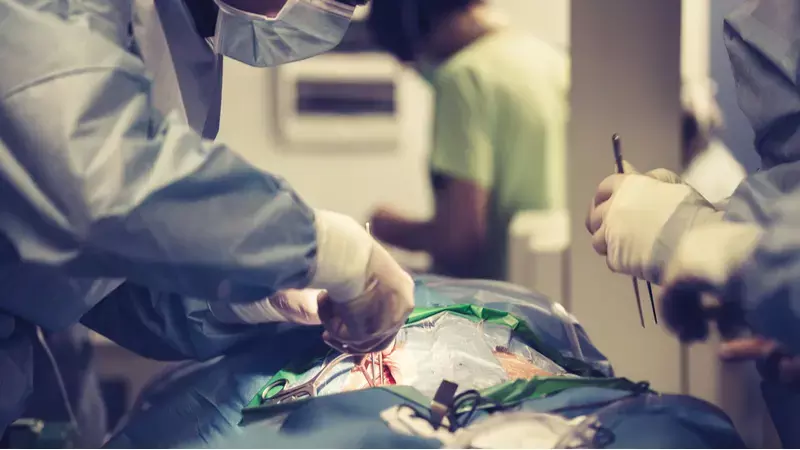- Home
- Medical news & Guidelines
- Anesthesiology
- Cardiology and CTVS
- Critical Care
- Dentistry
- Dermatology
- Diabetes and Endocrinology
- ENT
- Gastroenterology
- Medicine
- Nephrology
- Neurology
- Obstretics-Gynaecology
- Oncology
- Ophthalmology
- Orthopaedics
- Pediatrics-Neonatology
- Psychiatry
- Pulmonology
- Radiology
- Surgery
- Urology
- Laboratory Medicine
- Diet
- Nursing
- Paramedical
- Physiotherapy
- Health news
- Fact Check
- Bone Health Fact Check
- Brain Health Fact Check
- Cancer Related Fact Check
- Child Care Fact Check
- Dental and oral health fact check
- Diabetes and metabolic health fact check
- Diet and Nutrition Fact Check
- Eye and ENT Care Fact Check
- Fitness fact check
- Gut health fact check
- Heart health fact check
- Kidney health fact check
- Medical education fact check
- Men's health fact check
- Respiratory fact check
- Skin and hair care fact check
- Vaccine and Immunization fact check
- Women's health fact check
- AYUSH
- State News
- Andaman and Nicobar Islands
- Andhra Pradesh
- Arunachal Pradesh
- Assam
- Bihar
- Chandigarh
- Chattisgarh
- Dadra and Nagar Haveli
- Daman and Diu
- Delhi
- Goa
- Gujarat
- Haryana
- Himachal Pradesh
- Jammu & Kashmir
- Jharkhand
- Karnataka
- Kerala
- Ladakh
- Lakshadweep
- Madhya Pradesh
- Maharashtra
- Manipur
- Meghalaya
- Mizoram
- Nagaland
- Odisha
- Puducherry
- Punjab
- Rajasthan
- Sikkim
- Tamil Nadu
- Telangana
- Tripura
- Uttar Pradesh
- Uttrakhand
- West Bengal
- Medical Education
- Industry
Among Post TAVI Patients with IE, Cardiac Surgery No Better Than Antibiotics

Infective endocarditis (IE) is a common life-threatening disease with high in-hospital mortality of nearly 20%. This group of patients requires timely radical surgical treatment that involves the removal of the infected valve, followed by valve prosthesis implantation. Since large floating vegetations on the valve surface have developed, emergent surgical treatment is indicated.
However, a recent study suggests that cardiac surgery failed to improve clinical outcomes when compared with antibiotic treatment alone among high-risk patients who developed infective endocarditis after transcatheter aortic valve implantation (TAVI). The study findings were published in the Journal of American College of Cardiology on February 21, 2022.
One-third died during the hospital admission for endocarditis, and almost one-half died within 1 year. The optimal treatment of patients developing infective endocarditis after TAVI still remains understudied. Therefore, Dr Norman Mangner and his team conducted a study to investigate the clinical characteristics and outcomes of patients with TAVI-IE treated with cardiac surgery and antibiotics (IE-CS) compared with patients treated with antibiotics alone (IE-AB).
In this study, the researchers used crude and inverse probability of treatment weighting analyses for the treatment effect of cardiac surgery vs medical therapy on 1-year all-cause mortality in patients with definite TAVI-IE. They used data from the Infectious Endocarditis after TAVI International Registry. They identified 584 patients, among which 111 patients (19%) were treated with IE-CS and 473 patients (81%) with IE-AB.
Key findings of the study:
- Compared with IE-AB, the researchers found that IE-CS was not associated with lower in-hospital mortality (HRunadj: 0.85) and 1-year all-cause mortality (HRunadj: 0.88) in the crude cohort.
- After adjusting for selection and immortal time bias, they found no association in lower mortality rates for in-hospital mortality (HRadj: 0.92) and 1-year all-cause mortality (HRadj: 0.95) in the IE-CS group than IE-AB group.
- They observed similar results when patients with and without TAVI prosthesis involvement were analyzed separately.
- They noted that the predictors for in-hospital and 1-year all-cause mortality were logistic EuroSCORE I, Staphylococcus aureus, acute renal failure, persistent bacteremia, and septic shock.
The authors concluded, "In this registry, the majority of patients with TAVI-IE were treated with antibiotics alone. Cardiac surgery was not associated with an improved all-cause in-hospital or 1-year mortality. The high mortality of patients with TAVI-IE was strongly linked to patients' characteristics, pathogen, and IE-related complications."
In an accompanying editorial, Dr Joanna Chikwe noted that this study underlines the poor surgical outcomes in patients who have undergone TAVR because of poor surgical candidacy, as well as the dismal outcomes associated with medical management of prosthetic valve endocarditis complicated by persistent bacteremia, large vegetations, or annular abscess.
She wrote, "If indeed >40% of these patients developed endocarditis due to healthcare-associated infections, a stronger case should probably be made for aggressive antibiotic prophylaxis and prevention strategies in high-risk patients after TAVR, particularly for patients requiring chronic treatment such dialysis or readmission to hospital."
For further information:
DOI: https://www.jacc.org/doi/full/10.1016/j.jacc.2021.11.056
Medical Dialogues Bureau consists of a team of passionate medical/scientific writers, led by doctors and healthcare researchers. Our team efforts to bring you updated and timely news about the important happenings of the medical and healthcare sector. Our editorial team can be reached at editorial@medicaldialogues.in.
Dr Kamal Kant Kohli-MBBS, DTCD- a chest specialist with more than 30 years of practice and a flair for writing clinical articles, Dr Kamal Kant Kohli joined Medical Dialogues as a Chief Editor of Medical News. Besides writing articles, as an editor, he proofreads and verifies all the medical content published on Medical Dialogues including those coming from journals, studies,medical conferences,guidelines etc. Email: drkohli@medicaldialogues.in. Contact no. 011-43720751


